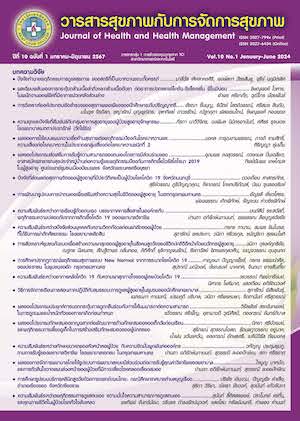The Development of Self-Direction Model to Enhance Life Happiness of Older Adults in Bangkok Metropolitan
Keywords:
Self-Direction Model, Life-Happiness, Older adults, BangkokAbstract
The purpose of this mixed-methods research design were: 1) to study life happiness of older adults, 2) to develop the self-direction model to enhance life happiness of older adults, and 3) to study the results of using the self-direction model to enhance life happiness of the older adults. The population used in this study were 248,071 older adults aged between 60-75 years living in east bound of Bangkok. The sample used in this study was divided into 2 groups: 1) sample group 1 comprised 111 older adults, was used to study life happiness, obtained from multi-stage selection from the population according to the specified criteria, and 2) sample group 2 comprised of 40 older adults obtained from the purposive selection the sample group 1 who life happiness scores were lower than 50th percentile and volunteered to participate in the experiment. Those were then randomly selected into 20 of each experimental and control groups. The older adults in the experimental group received a self-direction model to enhance life happiness while the control group did not receive the self-direction model and participate in activities of the Elderly Club as usual. The research instruments were: 1) the life happiness scale of the older adults with item objective congruence (IOC) index ranged from 0.67-1.00, the item discrimination power ranged from .24-.77, and the reliability coefficient was .92, and 2) the self-direction model which the researcher developed from three psychological theoretical concepts, consisting of existentialism, constructivism, and adult learning theory, with item objective congruence (IOC) index of 1.00. The statistics used for analyzing the data were (1) analysis of qualitative data obtained from interviewing were empirical data on life happiness and from a synthesis of life happiness related literature. Those were used to define an operational definition of life happiness of the older adults, and 2) analysis of quantitative data obtained from using the self-direction models to enhance life happiness of the older adults. Statistics included mean, and standard deviation (, SD), Normality test, Wilcoxon Matched Pairs Signed-Ranks Test, and Mann-Whitney U-Test. The research results were: (1) the life happiness of 111 older adults was at a moderate level, (2) the self-direction model developed from the concepts of three psychological theories: Existentialism, Constructivism, and Adult Learning Theory, and (3) overall life happiness of the older adults in the experimental group after the experiment and after the follow-up were higher than before the experiment with statistical significance at .01, and significantly higher than that of the control group at the .01 level.
References
กันย์ธนัญ สุชิน, ธนพัทธ์ จันท์พิพัฒน์พงศ์, และทิพวรรณ เมืองใจ. (2563). การศึกษาและพัฒนารูปแบบเพื่อเสริมสร้างความสุขจากปัจจัยที่มีอิทธิพลต่อความสุขของผู้สูงอายุ อำเภอเชียงของ จังหวัดเชียงราย. วารสารชุมชนวิจัย, 14(3), 58-71.
กัณฐิกา ปัญญาละ, กัญญ์ชล วัฒนากูล, และวรพล ยะมะกะ. (2563). ระดับความสุขของผู้สูงอายุในอำเภอสันกำแพง จังหวัดเชียงใหม่. สืบค้นจาก https://www.econ.cmu.ac.th/econ_paper/admin/files/paper/601632003/011%20%E0%B8%81%E0%B8%B1%E0%B8%93%E0%B8%90%E0%B8%B4%E0%B8%81%E0%B8%B2%20%E0%B8%9B%E0%B8%B1%E0%B8%8D%E0%B8%8D%E0%B8%B2%E0%B8%B0%20601632003.pdf
พระครูอุทัยธรรมานุกูล (สามารถ อิทฺธิญาโณ). (2560). พลังคิดบวกในการบริหารงานตามแนวพุทธบูรณาการ. วารสารสถาบันวิจัยญาณสังวร, 8(2), 89-100.
ลัดดาวัลย์ พุทธรักษา, สนอง โลหิตวิเศษ, รุ่งแสง อรุณไพโรจน์, และพรรณวิภา บรรณเกียรติ. (2556). รูปแบบการพัฒนาผู้ดูแลผู้สูงอายุโดยวิธีการเรียนรู้ด้วยการนำตนเองและการจัดการความรู้. วารสารวิจัยทางการศึกษา, 7(2), 1-10.
Creswell, J.W. (2013) Research Design: Qualitative, Quantitative, and Mixed Methods Approaches. 4th Edition. London: SAGE Publications, Inc.
Spector, A., Thorgrimsen, L., Woods, B. O. B., Royan, L., Davies, S., Butterworth, M., & Orrell, M. (2003). Efficacy of an evidencebased cognitive stimulation therapy programme for people with dementia: randomised controlled trial. The British Journal of Psychiatry, 183(3), 248-254.
Downloads
Published
How to Cite
Issue
Section
License
Copyright (c) 2024 Journal of health and health management

This work is licensed under a Creative Commons Attribution-NonCommercial-NoDerivatives 4.0 International License.




